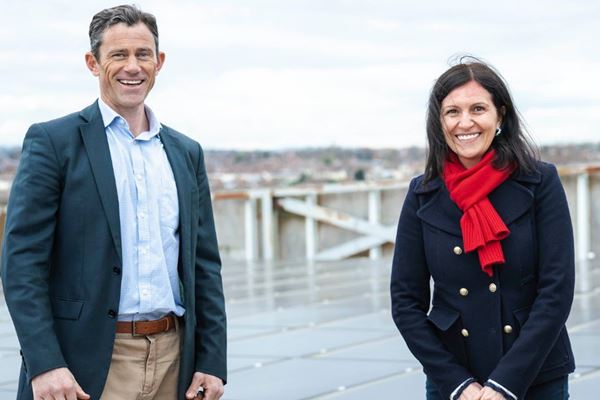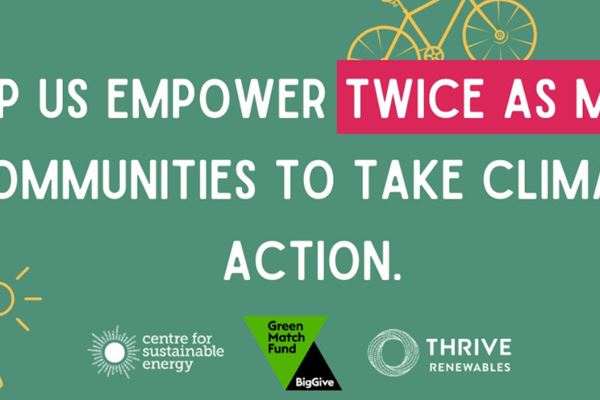Climate change is no longer a future problem – it’s here and it’s real. And with examples of extreme weather events becoming more and more frequent, it’s easy to feel overwhelmed by the climate emergency and frustrated by the inaction from government and policymakers around the world.
But there’s no denying it – the energy transition is happening (although not as quickly as we would like), and renewables are here to stay. Below we share some of the reasons we’re keeping positive as we look forward to another year of prioritising people and planet, funding and building new projects that deliver cheaper, cleaner power, lower household bills and support the UK’s transition to a fairer, net zero energy system.
Renewables produced enough electricity in 2023 to power every UK home
According to The Energy & Climate Intelligence Unit (ECIU)[1], the UK’s fleet of wind, solar and hydro projects generated enough clean electricity to power the country’s 28 million homes in 2023. The think tank has estimated that these assets produced over 90TWh of electricity, while power generation from gas-fired power plants fell by 20 to 30 per cent each quarter compared to four years ago. New data from Carbon Brief has also found that renewables provided the single largest source of power to the grid last year at a record 42%.
World leaders agreed to triple renewables by 2030
In one of the most widely supported pledges at the recent COP28 conference in Dubai, over 110 policymakers agreed to tripling the world’s renewable capacity by 2030. During the conference, the European Commission president, Ursula von der Leyen, stated that “With these goals, we […] send a clear message to industries and investors. We are providing them with clarity and predictability about the future – the direction of travel. They will know how much additional capacity we need by 2030 and this will help them plan their business and investments”[2].
The move supports the International Renewable Energy Agency’s ‘World Energy Transitions Outlook’ which looks at how we close the energy transition gap to stay on a 1.5°C pathway. It calls for a tripling of installed renewables capacity from around 3,400 GW today to over 11,000 GW by 2030, adding on average an ambitious 1,000 GW annually until the end of this century.
Batteries are booming
According to Modo Energy, Britain’s battery pipeline saw a significant increase in operational capacity (over 60%) in 2023, growing from 2.1GW at the close of 2022 to 3.4GW. Total energy capacity has reportedly grown even quicker, up to 4.5 GWh from 2.3 GWh in 2022 – meaning that the average duration of battery energy capacity in Britain is now 1.27 hours, up from 1.1 hours in 2022.
Battery storage is a critical technology for net zero, storing electricity when renewable sources are abundant and releasing at peak times when consumer demand is at its highest. We’re pleased to share that our 20 MW battery project in Bristol is now operational, with the capacity to store and deliver 1.5 hours or 30 MWh of electricity.
The UK’s first geothermal power plant will be constructed this year
Construction of a new geothermal power plant system at United Downs in Cornwall has begun, with the site expected to start producing baseload renewable electricity by late 2024. Geothermal Engineering Limited (GEL) awarded the supply contract to Exergy International last year, with the deal marking a major milestone in the project which Thrive provided the first commercial funding for in 2020, followed by a further £3 million investment in 2023. Once operational, GEL believes United Downs will save more than 6,500 tonnes of CO2 emissions per year compared to fossil fuel power generation, while also producing zero carbon heat that could be used to heat a nearby housing development.
We aim to double the amount of clean energy capacity we fund over the next five years
Reflecting our commitment to tackling climate change, we revealed our ambitions to double our generation capacity to 180 MW over the next five years. 2024 will see us deliver on our growing pipeline, which includes funding 192 MW of solar and battery storage through our £20 million deal with Ethical Power, as well investing in other onshore wind, solar, geothermal and battery storage projects across the UK.
As we look forward to another exciting year ahead, we’d like to say a massive thank you to everyone who supported us in 2023. It’s because of you that Thrive can continue making an impact by building new renewable capacity, ensuring the benefits are felt by the people who need it most.
[1] ECIU: Renewables produced enough electricity in 2023 to power every UK home | BusinessGreen News
[2] COP28: Global leaders agree to triple renewables capacity by 2030 - reNews - Renewable Energy News



